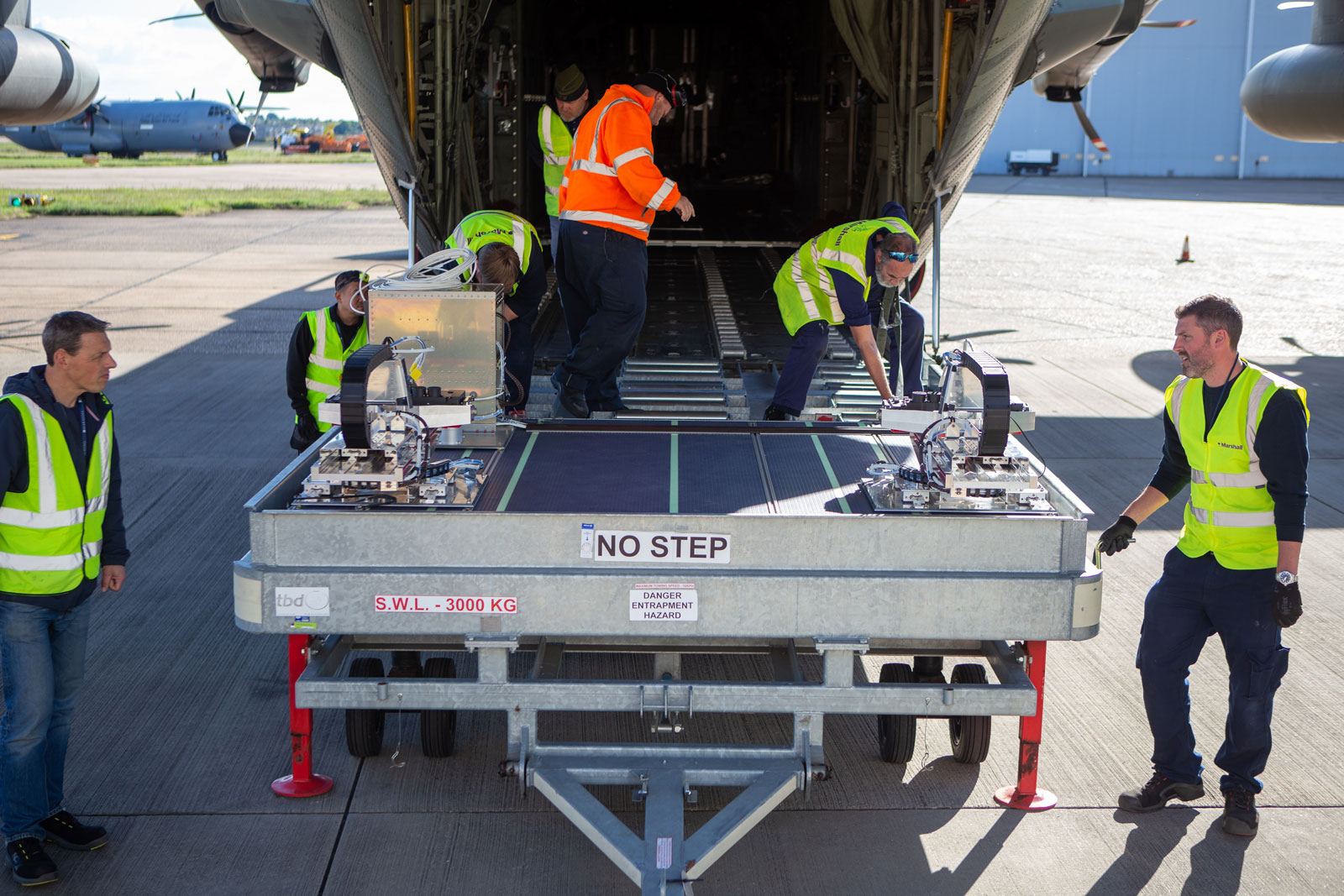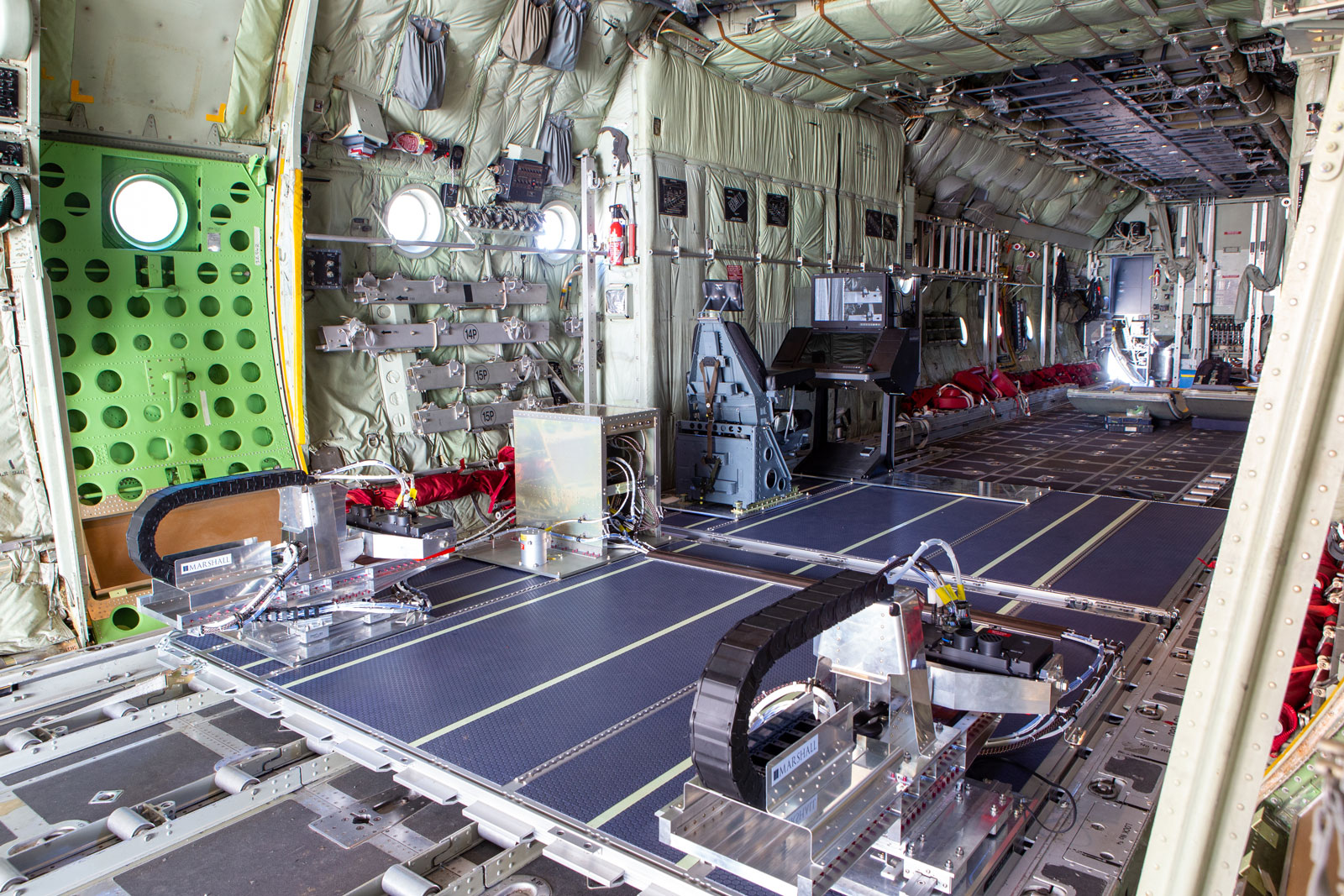
Marshall Aerospace today unveiled ARC-Radar, a modular sensor suite that allows operators of tactical transport aircraft to rapidly and temporarily outfit their fleet for intelligence, surveillance and reconnaissance (ISR) missions. ARC-Radar is the first of several products that will be rolled out within the Marshall Adaptable Role-fit Capability (ARC) family in the near future.
Marshall ARC-Radar solves a key logistical problem facing fleet operators: since ISR tasks require complex combinations of sensitive equipment, system installation tends to require extensive and typically permanent modifications to their aircraft or investment in a purpose-built ISR airframe.
By contrast, Marshall ARC-Radar is a role-fit palletised solution with no permanent integration and no modifications required, utilising only existing aircraft power outlets.
The system comprises a two-panel Leonardo Osprey 30 multi-domain active electronically scanned array (AESA) surveillance radar, two modified paratroop doors containing a Marshall-designed and manufactured ultra-low-profile conformal radome, a rear pallet containing two articulated radar mounts and line-replaceable unit (LRU) rack, and a forward pallet containing a mission management console.
The industry-leading capabilities of Leonardo’s radar, combined with the inherent multi-role flexibility of tactical transport platforms, means that Marshall ARC-Radar’s potential applications are remarkably broad, ranging from military ISR land, sea or air missions to applied civilian operations such as search and rescue, humanitarian support, and disaster relief. Despite being fitted temporarily, the Osprey 30 radar suite maintains full performance during operation.

The entire Marshall system can be fitted or removed in under four hours, guaranteeing minimal aircraft downtime. No modifications need to be made to the underlying aircraft and there are no performance or handling penalties with the product installed. The result is that fleet operators are freely able to alter the role of an aircraft on a day-by-day basis. The role-fit nature of the solution means that operators are not constrained to the availability of a single aircraft.
The system provides significant cost savings by offering the core capability of a dedicated ISR system but with the added flexibility of a transferable multi-mission system utilising an existing fleet – a potential saving of millions. The scalable nature of the system also allows for future growth of ISR capability at minimal cost.
“The unique benefit of this roll-on-roll-off system is that it effectively expands the utilisation of existing assets for multi-mission purposes,” says Ben Jakubowski, head of Marshall Aerospace’s Future Products team.
“This means the operator could be transporting troops on a Monday and conducting an ISR mission on a Tuesday with the same aircraft, our solution offers true operational mobility.”

Marshall ARC-Radar has undergone extensive testing on the Lockheed Martin C-130J Super Hercules platform. In addition to ground-fit trials, a product proving sortie was recently flown with the aim of testing the capability of the radar. During this flight trial, all radar modes were tested and their performance thoroughly verified by Leonardo representatives on a range of static and moving targets of various sizes over both land and sea.
“Marshall’s system using our Osprey 30 AESA radar demonstrated performance which looked as good as any similar system I have tested to date,” commented Stan Hargreaves, Leonardo’s Head of Operational Demonstrations, who operated the radar during the flight trial. “The Marshall Team should be immensely proud of the innovative product they have developed.”
Additionally, the modular format of the Marshall ARC platform will allow multiple interchangeable missions across various C-130 configurations, as well a wider range of military transport aircraft. Likewise, the system’s modularity also provides a simplified future upgrade path for a range of sensors and satcom solutions as technology evolves.
| Marshall ARC-Radar system key specifications | |
|---|---|
| Maximum range | 200NM |
| Targets | Up to 1000 tracks |
| Modes | Maritime Surface Surveillance: Maritime surveillance Small target mode |
| Strip and Spot SAR Ground Mapping: High resolution wide area ground mapping | |
| Moving target detection: Ground, Maritime and Air MTI Air-to-Air Intercept | |
| Aircraft interface | Standard 463L Master Pallet |
To learn more about the Marshall ARC-Radar system, click here.